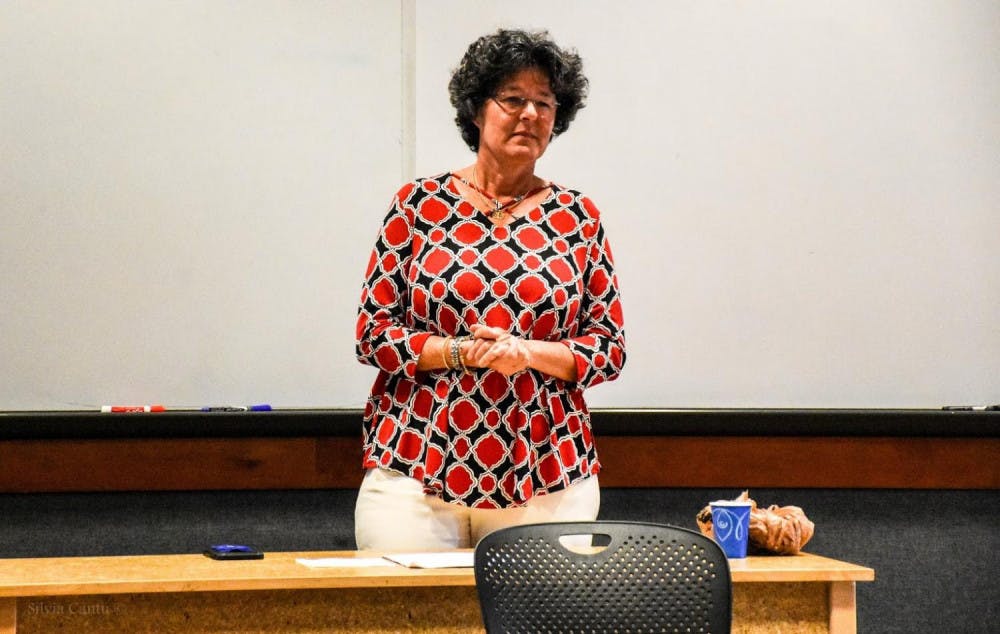The judge presiding over the legal case that may determine the future of affirmative action in higher education is Allison D. Burroughs, who graduated from the college in 1983.
The conservative-led group Students for Fair Admissions (SFFA) brought a lawsuit against Harvard, claiming that the university discriminates against Asian applicants. The divisive case has inflamed both opponents and supporters of affirmative action, given the wide impact it could have on higher education. The trial is expected to end next week. But however Burroughs rules, the case stands a strong chance of eventually reaching the U.S. Supreme Court on appeal, where justices may choose to restrict the role of race in college admissions.
Burroughs, a judge on the U.S. District Court of Massachusetts, graduated from the college with a degree in political science before pursuing a law degree at the University of Pennsylvania. Following her appointment to the District Court by President Barack Obama in 2014, she gained significant notoriety in January 2017, when she issued a temporary restraining order against President Donald J. Trump’s travel ban.
SFFA originally filed a motion in 2014, arguing that the structure of Harvard’s admissions process essentially creates an illegal racial quota, favoring white, Hispanic and black students while discriminating against Asian applicants. SFFA has compared Harvard’s policies to the quotas established in the 1920s that targeted Jewish students.
 PIA CONTRERAS
PIA CONTRERAS
As evidence for discrimination, the group has also cited a 2013 internal Harvard report showing that the university’s admissions committee assigned lower “personality ratings” to Asian applicants than those of other racial or ethnic groups.
Harvard has denied SFFA’s accusations and maintains that the admissions committee did not institute target-quotas against any particular group, be it racial, geographic or any other category. Instead, the institution has said it provides “some attention to numbers” in order to preserve its diverse community. Joined by its fellow Ivy League universities and other schools like MIT and Stanford in an amicus brief, Harvard has defended a “holistic” admissions approach that is conscious of racial identity.
The plaintiffs proposed a new form of affirmative action which would focus on socio-economic status. In response, Rakesh Khurana, the dean of Harvard College, said that Harvard’s goal is not to accurately represent the income distribution of the nation, according to the Harvard Crimson.
“What we’re trying to do is identify talent and make it possible for them to come to a place like Harvard,” Khurana said.
Attention to the case increased after the U.S. Department of Justice announced internally in 2017 that it was funneling resources into investigating and possibly litigating against “race-based discrimination in college and university admissions.” However, a year earlier, the U.S. Supreme Court upheld in a case against the University of Texas that race was a permissible admissions factor.
Political Science Professor Murray Dry suspects that Burroughs will uphold the Supreme Court’s precedent, thus reaffirming Harvard’s holistic approach. But he noted that new factors set the Harvard case apart from previous lawsuits, such as SFFA’s strong accusations of discrimination and Burroughs’ own judgement.
“As Judge Burroughs said when she gave her talk last fall at Middlebury, a judge must apply the facts to the law in an impartial manner,” Dry said. “I have full confidence that she will do just that.”
Not everyone has demonstrated the same confidence in Burroughs’ impartiality. An individual going by the name “Veritas in Diversitas” circulated an email to all the reporters covering the trial, the New York Times reported Monday, insinuating that Burroughs was biased against Harvard because she had been denied admission there as an undergraduate. The email, titled “Federal Judge Hides Her Own Painful History of Harvard Rejection,” insists that Burroughs remains bitter about her own rejection as the child of an alumnus, though Burroughs already disclosed the fact in the pretrial hearings.
Despite the inflammatory message, both parties in the trial declared that they did not wish for Burroughs, who has worked on the case since 2014, to recuse herself.
Regardless of the decision she eventually reaches, Burroughs may not decide the ultimate fate of the case. Dry, a former teacher of Burroughs’, recalls her telling him that the case would ultimately be settled “above her paygrade,” meaning it would likely be appealed to the First Circuit and eventually to the Supreme Court, no matter how she rules.
The lawsuit would face a different set of justices compared to previous affirmative action cases if it reaches the Supreme Court. With the addition of Justices Brett Kavanaugh and Neil Gorsuch, the court has swung right, and a ruling against race-conscious admissions may change universities’ admissions policies across the country.
While the case could significantly impact Middlebury’s admissions process, Dean of Admissions Greg Buckles warned against jumping to conclusions too quickly.
“We are monitoring the situation through the media, professional conferences, and our various consortium relationships,” Buckles said. “There isn’t much to say right now, given it’s an ongoing trial that will likely take quite some time to wrap up. Until we know more, I’m not prepared to speculate on the possible outcomes.”
Burroughs ’83 Presides Over Major Affirmative Action Case

Silvia Cantu Bautista/The Middlebury Campus
Judge Allison D. Burroughs, pictured during a 2017 lecture at Middlebury, is presiding over a major case challenging Harvard's race-conscious admission practices.
Judge Allison D. Burroughs, pictured during a 2017 lecture at Middlebury, is presiding over a major case challenging Harvard's race-conscious admission practices.
Comments



